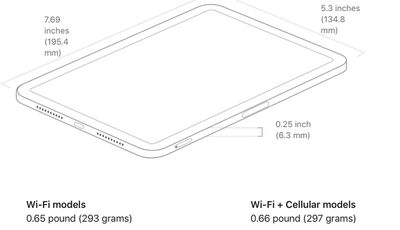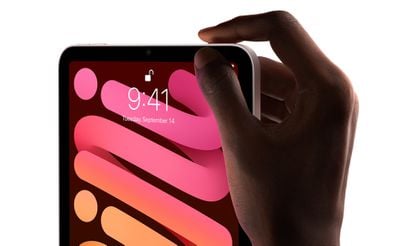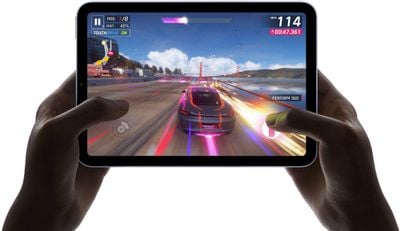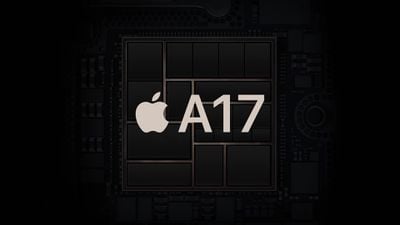iPad mini
Updated with A17 Pro chip and more for Apple Intelligence, available to order now.

Should You Buy an iPad mini?
The iPad mini is Apple's smallest tablet device and the latest model features a slim-bezeled design, an A17 Pro chip with Apple Intelligence support, a USB-C port, and Apple Pencil Pro support.
Launched in October 2024, the iPad mini is at the beginning of its product cycle, which means that now is the best time to buy an iPad mini.
While the iPad mini is Apple's smallest iPad, designed for those who want features like an all-screen design and USB-C in the most portable form factor, users who are looking for a more affordable option should consider the 10th-generation iPad. Starting at $329, the iPad offers many iPad mini features, such as Touch ID and Center Stage, but at a lower price that balances functionality and affordability.
On the other hand, for an iPad with a larger display, there is the $599 iPad Air. The iPad Air features a Smart Connector on its rear to connect to keyboard cases and its larger, 11-inch display is better for productivity tasks and media consumption. Apple's iPad Pro is the highest-end iPad, and it is much more expensive with a $999 starting price.
- iPad Mini 6 vs. iPad Mini 7 Buyer's Guide: 20 Upgrades Compared
- Picking the Best iPad to Buy in 2024
Before buying, check out our iPad deals guide, where we keep track of the current best price on the iPad mini, iPad Air, iPad, and iPad Pro.
The iPad mini 7
Contents
Apple introduced the seventh-generation iPad mini in October 2024, three years after introducing the prior-generation iPad mini 6. The iPad mini 7 is essentially a smaller version of the iPad Air, and the main draw of the newest model is the A17 Pro chip with Apple Intelligence support.
Compared to the iPad mini 6, the iPad mini 7 has not received design updates. It continues to look like the iPad Air with an all-screen design, squared-off edges, and a Touch ID fingerprint scanner in the top power button. The iPad mini has an 8.3-inch Liquid Retina display with a resolution of 2,266 by 1,488. The display continues to feature True Tone and P3 wide color, and offers up to 500 nits of brightness.
It is equipped with the 3-nanometer A17 Pro chip, which is a chip that Apple first used in the 2023 iPhone 15 Pro models. The A17 Pro supports Apple Intelligence, and it is much faster and more efficient compared to the prior A15 chip. The 6-core CPU in the A17 Pro is 30 percent faster than the CPU in the A15, and the 5-core GPU is 25 percent faster than the A15's GPU.
The A17 Pro supports hardware-accelerated ray tracing and mesh shading, two effects that are noticeable when gaming. With these features, the iPad mini 7 supports console-quality games like Resident Evil and Death Stranding. Dynamic Caching is also available for better GPU memory allocation and usage.
There is a 16-core Neural Engine that is twice as fast as the Neural Engine in the A15 chip, and there is 8GB RAM, up from 4GB. With the A17 Pro, the iPad mini 7 supports all of the Apple Intelligence features.
Apple used the same 12MP Wide rear camera with an ƒ/1.8 aperture, but it now supports Smart HDR 4 for better HDR in images that looks more vivid and detailed, and there is an updated True Tone flash for low light conditions and for scanning documents using the Notes app. As for the front-facing camera, the iPad mini 7 uses the same 12MP Ultra Wide camera, featuring Center Stage for video calls.
Like the iPad mini 6, the cellular version of the iPad mini 7 supports sub-6GHz 5G networks, an upgrade over LTE. Apple also added support for Wi-Fi 6E, which means the iPad mini 7 is able to connect to the faster 6GHz band on supported routers. Bluetooth connectivity has been upgraded to version 5.3, and Apple removed the nano-SIM card slot worldwide, offering only digital eSIM options for connectivity.
The iPad mini comes in four colors, including Blue, Starlight, Purple, and Space Gray. The blue is a new color, and the purple is a lighter shade than was available with the iPad mini 6. Along with the new color options, there is now "iPad mini" rather than "iPad" labeling on the back of the tablet, which is one way to distinguish the seventh-generation model from the sixth-generation model.
The iPad mini 7 works with the Apple Pencil Pro, the newest Apple Pencil that Apple introduced alongside the iPad Pro. The Apple Pencil Pro has support for squeeze gestures, barrel roll, Apple Pencil hover, and Find My, plus it offers haptic feedback in response to gestures. The Apple Pencil Pro magnetically attaches to the side of the tablet for storage, pairing, and charging. The cheaper Apple Pencil (USB-C) also works with the iPad mini 7.
Apple did not update the battery life, and it still features the same all-day battery life as other iPads, lasting up to around 10 hours. There continues to be a USB-C port for charging, and it now features USB-C 3.1 Gen 2 for data transfers up to 10Gb/s.
Base storage has been doubled, so the entry-level iPad mini starts with 128GB of storage, up from 64GB. 256GB and 512GB options are available as upgrades.
The iPad mini is available to order now and starts at $499 for the 128GB Wi-Fi-only model, going up to $799 for the 512GB model. Cellular models are available for $150 more over the base price of each configuration. The Apple Pencil Pro that works with the iPad mini is available for $129.
Note: See an error in this roundup or want to offer feedback? Send us an email here.Reviews
Based on reviews of the iPad mini 7, Apple has addressed the jelly scrolling issue that was a problem with the prior iPad mini 6.
Reviews of the iPad mini 7 have been mixed, largely because the update focused solely on the internals. According to The Verge, the iPad mini 7 feels like an afterthought because of its hodgepodge of parts from other devices, such as the A17 Pro chip that was first used in the iPhone 15 Pro.
The reason to buy the iPad mini 7 is because it's the iPad mini with the smaller screen size, and in terms of price, the $499 is only $100 less than the larger M2 iPad Air.
Six Colors said that it's the "same iPad mini as three years ago" except for the A17 Pro chip with Apple Intelligence support. It does not look as modern as other Apple devices with the thick bezels around the display, and the colors this year are "watered-down versions" of the prior "fun" color options.
Engadget called the iPad mini 7 update "boring," but praised the addition of Apple Pencil Pro support and the 128GB starting storage upgrade. Wired said there's no real reason to upgrade to an iPad mini 7 if you already have the iPad mini 6, and MacStories said that the the new tablet "felt old" and that it's "pretty much" the same iPad mini that came out in 2021.
On the plus side, most reviewers agreed that the iPad mini 7 does not suffer from the same jelly scrolling issue that plagued the iPad mini 6, with little to no visible screen lag that's limited to one side of the display.
Design
The 2024 iPad mini 7 uses the same design as the previous sixth-generation iPad mini. Apple updated the iPad mini's design in 2021, and aside from new colors, the iPad mini 7 looks identical to the 2021 model. There is one distinguishing feature - Apple added an "iPad mini" label on the back of the tablet rather than an "iPad" label.
The iPad mini 7 has an all-display design with an 8.3-inch display that has no Home button. For biometric authentication, Apple uses a Touch ID sensor located in the power button at the top of the iPad mini.

Like the iPad Air, the iPad mini 7 has a body with flat, rounded edges that wrap around the display, with the flat-edged design matching the iPad Pro and modern iPhones. There's a small bezel all around the iPad mini's display.
The iPad mini measures in at 7.69 inches (195.4 mm) long, 5.3 inches (134.8 mm) wide, and 0.25 inches (6.3 mm) thick. As for weight, the iPad mini is Apple's lightest and smallest tablet, weighing in at 293 grams or 0.65 pounds. Cellular models are just a few grams heavier due to the extra hardware.

There are volume buttons at the top left of the iPad mini, and a magnetic connector on the side that's used to charge and connect to the Apple Pencil Pro. Speakers at the top and bottom of the iPad mini provide stereo sound when the iPad mini is used in landscape mode, plus there are dual microphones at the top.
At the back of the iPad mini, there is a single-lens rear camera and a True Tone flash. Cellular models used to have a nano-SIM tray, but Apple removed it this year.

The iPad mini 7 comes in Space Gray, Blue, Purple, and Starlight, a color that's a hybrid between silver and gold. Blue is new this year, and the purple shade is lighter than the prior purple Apple used for the 2021 model.
Touch ID Power Button
The Touch ID power button located at the top of the iPad mini works just like the Touch ID button on the iPad Air or the prior iPad mini 6, simply requiring you to rest your finger on it to register your fingerprint.

Touch ID can be used to unlock the iPad, access apps, make purchases with Apple Pay, and more. Touch ID on the iPad mini 7 works in both portrait and landscape orientations.
Holding down on the Touch ID power button allows it to double as a button for activating Siri.
USB-C
All of Apple's iPad models have USB-C, and the iPad mini is no exception. With a USB-C port, the iPad mini can be connected to 4K and 5K displays, cameras, and other USB-C devices. The USB-C port supports 10Gb/s data transfer, up from 5Gb/s in the prior model, and is able to charge an iPhone or Apple Watch with the proper cable.
Display
The iPad mini 7 features an 8.3-inch fully laminated display with a 2266x1488 resolution at 326 pixels per inch. Like the iPad Air, the iPad mini 7 supports Wide color for vivid, true-to-life colors, and it comes with True Tone support.

True Tone adjusts the white balance of the display to match the ambient lighting to make the screen easier on the eyes. If you're in a room with more yellow lighting, for example, the iPad mini's display turns warmer in color to avoid a stark contrast between the color of the iPad and the lighting in the room.
There's also an antireflective coating, and the iPad mini 7 features 1.8 percent reflectivity and 500 nits brightness. Like all iPads, it has a fingerprint-resistant oleophobic coating.
The iPad mini 7 has updated display hardware that likely addresses a "jelly scrolling" or screen tearing issue that was present on the iPad mini 6 when it was used in portrait mode. Apple did not change the positioning of the display controller inside, but there appears to be other changes in place to minimize the effect.
Apple Pencil Pro
While the iPad mini 6 used the Apple Pencil 2, the iPad mini 7 is compatible with both the entry-level Apple Pencil (USB-C) and the latest Apple Pencil Pro that was first introduced alongside the 2024 iPad Pro models. The Apple Pencil Pro is the most advanced version of the Apple Pencil to date. There are several new features, including an option to locate a lost Apple Pencil.

Barrel Roll
There is a gyroscope in the Apple Pencil Pro that allows the rotation of the barrel to change the orientation of certain tools. It basically offers much more precise control of shaped pen and brush tools, similar to how a real pen or brush would function when you tilt it while drawing or sketching.
Haptic Feedback
A built-in haptic engine offers haptic feedback when using the Apple Pencil Pro's gestures. A light haptic pulse responds when using a squeeze or double-tap gesture, plus there is feedback when using the snap to a Smart Shape feature.
Find My
Find My is available for the Apple Pencil Pro so it can be tracked right alongside the iPad and other devices in the Find My app.
Charging and Pairing
The Apple Pencil Pro attaches to the side of the iPad mini, and the magnetic connection enables automatic pairing and charging.
Existing Features
Current Apple Pencil features like Apple Pencil hover and double tap are supported. Hover lets you preview where the Apple Pencil touches down on the display before a mark is made, while double tap can be used for swapping between tools.
Low latency, tilt sensitivity, and pressure sensitivity are all included features.
A17 Pro Chip
The iPad mini 7 uses the A17 Pro chip that was first introduced in the 2023 iPhone 15 Pro models. The A17 Pro is built on the 3-nanometer process, an upgrade that makes the chip faster and more efficient than the A15 Bionic used in the prior-generation iPad mini. The A17 Pro used in the iPad mini 7 includes a 6-core CPU with two high-performance cores and four efficiency cores, along with a 5-core GPU compared to the 6-core GPU found on the A17 Pro used in the iPhone 15 Pro.

The GPU is 25 percent faster than the GPU in the A15 Bionic, and the CPU is 30 percent faster. The 16-core Neural Engine is up to 2x faster, performing nearly 35 trillion operations per second.
When Apple first introduced the A17 Pro, it said the chip features the biggest redesign in the history of Apple GPUs. It includes hardware-accelerated ray tracing for gaming purposes, offering more fluid graphics and true-to-life lighting. Hardware-accelerated ray tracing is up to four times faster than software-based ray tracing, and with MetalFX upscaling, the GPU and Neural Engine are able to produce high-resolution graphics without a huge amount of power draw.
Like other devices that use the A17 Pro or newer, the iPad mini 7 is capable of playing console-quality games like Resident Evil 4 and Death Stranding.
In a Geekbench benchmark test, the A17 Pro in the iPad nini received a single-core score of 2,840, and a multi-core score of 6,982, confirming notable improvement over the A15 Bionic chip. The Metal score came in at 25,895, a little bit lower than the 27,144 score earned by the iPhone 15 Pro, which also has the A17 Pro chip. The iPad mini has a 5-core GPU instead of the 6-core GPU that was in the iPhone 15 Pro's A17 Pro chip, which is the reason for the different Metal scores.
The A17 Pro supports Apple Intelligence, and it is compatible with the Apple Intelligence features that were introduced in iPadOS 18.1 and those that will be coming in future updates.
RAM
The iPad mini 7 has 8GB RAM, which is required for Apple Intelligence.
Storage Space
The iPad mini 7 starts with 128GB of storage space, but it can be upgraded to 256GB or 512GB of storage.
Rear Camera
The iPad mini 7 includes a single ƒ/1.8 12-megapixel wide-angle rear-facing camera with digital zoom up to 5x, a five-element lens, and an updated quad-LED True Tone flash. It's an adequate camera and the same camera that's included with the iPad Air, but it's not as advanced as the cameras used in the latest iPhones and the iPad Pro.

Most of Apple's modern camera features are supported, such as panoramas, Burst Mode, Live Photos, autofocus with Focus Pixels, wide color capture, auto image stabilization, and more, plus Smart HDR 4 is new this year. Smart HDR 4 provides a more vivid, detailed vivid look for images.
4K video recording is supported at 24, 25, 30, or 60 frames per second, as is slo-mo video at 120 or 240 frames per second. The iPad mini 7 can also record in 1080p at 30 or 60 frames per second, and it supports continuous autofocus, cinematic video stabilization, and time-lapse video with stabilization.
Front-Facing Camera and Center Stage
There's a front-facing FaceTime HD camera with an ƒ/2.4 aperture and a 122 degree field of view. The front-facing camera has the same features as the rear camera, but it also supports Center Stage, a FaceTime feature that Apple first introduced with the iPad Pro.

Center Stage is designed to keep you in focus and perfectly framed when you're on a FaceTime video call. The wide-angle front-facing camera shows more of the room that you're in, while the A17 Pro works to keep you front and center even as you move around.
If more than one person is participating in the call, the camera zooms out to attempt to keep everyone in view and make sure they're part of the conversation. Though designed with FaceTime in mind, Center Stage also works with other third-party video apps like Zoom.
Battery Life
The iPad mini 7 is equipped with a 19.3-watt-hour battery, which is the same battery that was included in the previous-generation iPad mini.
According to Apple, the battery lasts for up to 10 hours when surfing the web on WiFi or watching video, while cellular models last for up to nine hours of surfing the web on a cellular connection. Like the iPad mini 6, the iPad mini 7 supports 20W fast charging.
Connectivity
The seventh-generation iPad mini includes a 5G chip that allows it to connect to 5G networks, but unlike the 5G iPhone models for the United States, it does not support the fastest mmWave 5G networks. Instead, it is limited to the slower but more widespread Sub-6GHz networks.
mmWave 5G networks are the fastest 5G networks, but mmWave is short-range and can be obscured by buildings, trees, and other obstacles, so its use is limited to major cities and urban areas along with venues like concerts, airports, and other places where a lot of people congregate.
Sub-6GHz 5G is much more widely available and available in urban, suburban, and rural areas across the United States and other countries. For the most part, when you use a 5G network, you'll be using Sub-6GHz 5G, and at this point in time, mmWave connectivity won't be missed because of its limited availability.
Cellular iPad mini models used to have a nano-SIM slot, but that has been removed and eSIM is now the only connectivity option.
Bluetooth and WiFi
The iPad mini 7 supports Wi-Fi 6E and Bluetooth 5.3 technology. Wi-Fi 6E allows the iPad mini to connect to faster and less congested 6GHz networks when 6GHz is available.
Other Features
The iPad mini 7 is equipped with a three-axis gyroscope, an accelerometer, a barometer, and an ambient light sensor.
How to Buy
The iPad mini can be ordered from the online Apple Store and Apple retail stores. The 128GB iPad mini is available for $499, but 256GB and 512GB models are also available at higher prices. The WiFi and Cellular model with 128GB storage is priced at $649.
What's Next for the iPad mini
Apple is rumored to be testing a small-sized OLED display that could be used for the next-generation iPad mini. OLED display technology provides more precise color reproduction and deeper blacks compared to LED displays, because OLED pixels can be individually controlled.
OLED also provides better contrast, faster response times, improved viewing angles, and more design flexibility.
The iPad mini 8 could have an OLED display, with Apple releasing it as soon as 2026, though 2027 is also a possibility.

